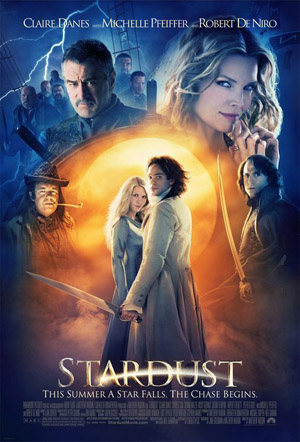 I hope Alan Moore goes to see Stardust. His work has never been treated with such reverence as Matthew Vaughn shows Neil Gaiman, but the film instills hope that it might be. Whether or not Moore buys a ticket, you definitely should. Not to make the point too directly, but it’s a wonderful piece of fantasy. Would that it never falters, but the film creates a world that shimmers with faerie and trembles with unbound menace.
I hope Alan Moore goes to see Stardust. His work has never been treated with such reverence as Matthew Vaughn shows Neil Gaiman, but the film instills hope that it might be. Whether or not Moore buys a ticket, you definitely should. Not to make the point too directly, but it’s a wonderful piece of fantasy. Would that it never falters, but the film creates a world that shimmers with faerie and trembles with unbound menace.
With co-writer Jane Goldman, Vaughn has distilled Gaiman’s work into an accessible but detailed vision. It retains important signature ideas: faerie as a complimentary but not always compatible companion to the human realm; the humanity of evil; a matter of fact approach to story and ritual. The first time you see a trio of witches casually disembowel an animal to divine the future in it’s intestines, you’ll know Gaiman’s spirit is generally intact.
It’s also a great lot of fun. Michelle Pfeiffer overcomes her generic accent by having a grand time being an evil witch. As a fallen star Claire Danes has finally found a role that lets her be properly acidic and appealing. And instead of relying on swordplay — boilerplate action for fantasy — Stardust draws comedy and action from magic and treacherous royalty.
Vaughn cuts away some plot and character to emphasize the quest of Tristran (Charlie Cox), a young man who is unknowingly of royal blood. To win the hand of Victoria (Sienna Miller), the most beautiful girl in his village of Wall, Tristran pledges to cross the nearby wall into the magic world of Stormhold to retrieve a fallen star. Not that he knows magic lies behind those stacked stones, nor that the star turns out to be a gorgeous woman who is tied into a bloody rite of succession for the Stormhold throne.
Tristran finds the star Yvaine (Claire Danes), but others are on the hunt for her as well. A jewel she carries will crown the next king of Stormhold, and so draws out Septimus and Primus, the dead king’s last heirs. Her heart, if eaten, will grant hundreds of years of life, which entices an ages-old trio of witches.
A couple of issues arise with the plot. One is paramount: if, as claimed, stars constantly observe events on earth, why is Yvaine ignorant of the danger around her? There’s also the issue of the chorus, comprised of the shades of Septimus’s and Primus’s dead brothers. These ghosts cannot leave Stormhold until a king is chosen, and they hang around, looking as they did at the moment of death, to provide quick comedy relief. As the movie goes on Vaughn is often too happy to cut to the chorus to move the action along.
There’s a wealth of plot detail, but while the pace occasionally stumbles, it never loses the thread. Vaughn strings out the land of Stormhold in a way that is clear and enticing. He doesn’t belabor the obvious, such as Tristran’s heritage, nor rush to explain every detail in the first act, maintaining instead a pace that is steady and welcoming.
Rather than a fantasy world that feels uncomfortably like our own, or like every other story we’ve been told before, Stardust is not afraid to push off into it’s own territory. It features pirates who gather and sell lightening; a marketplace in which an item might cost the color of your hair; rivalries between witches who might eat the heats of stars.
Vaughn has simplified Gaiman’s original story somewhat for the screen, but the result doesn’t feel dumbed-down. At worst, you’ll get the sensation that time has run out for the disparate plot threads near the end, necessitating a bit of stereotypical crosscutting between characters as they race on horseback to the site of the finale. You’ll likely forget that journeyman technique as the conclusion unfolds, however, complete with the brutal abuse of a voodoo doll.
Are the effects always perfect? No, but they get the right ideas across. They also leave budgetary room for lovely costumes and extra on-screen talent. I’ll take Peter O’Toole’s absolutely wicked turn as the outgoing King of Stormhold over a better looking jar of eyes, period.
I thought Vaughn had perfectly cast Sienna Miller in his last movie, but here she’s ideal as the empty-headed pretty girl who sees a husband as a social adornment. And I enjoyed the transformation of Tristran as brought to life by Charlie Cox; he does sometimes adhere too close to the idea of the anonymous shop-boy, but as such he makes for an unlikely hero, which adds excitement to the climax.
There are a few scenes that land with a loud clunk; in some cases those that do look worse because the film around them is frequently so good. Robert De Niro grossly overplays the sky pirate Captain Shakespeare, making me yearn for the presence of Daniel Craig, who would have been far better suited. And as much as I love Ricky Gervais, casting him is a total mistake; he and Vaughn deserve a slap for slipping in an overt Extras reference, totally breaking the mood.
But even with those stumbles, Stardust had me enthralled. Blink past Gervais and De Niro and you’ve got a deeply magical story that doesn’t stoop to potshots at the genre. Instead, the movie relishes the chance to develop an alternate world in a way that only the best film fantasies have achieved: with depth, humor and danger.